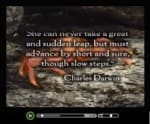Charles Darwin
Charles Darwin - Immediate Family
Charles Darwin (1809-1882) was born in Shrewsbury, England. He was the fifth of six children born to Robert Darwin (1766-1848) and Susannah Wedgwood-darwin (1765-1817). Susannah died when Charles was only eight years old. Charles was the grandson of two very prominent men of the time, Erasmus Darwin (1731-1802) and Josiah Wedgwood (1730-1795). Erasmus, who died several years before Charles was even born, was a dedicated evolutionist. Erasmus' pre-charles Darwin evolutionary writings include Zoonomia, or, the Laws of Organic Life (1794-1796, a two volume work). Consider this excerpt from his posthumous poem Temple of Nature (1802), "Organic life beneath the shoreless waves was born and nurs'd in ocean's pearly caves; First forms minute, unseen by spheric glass, move on the mud, or pierce the watery mass; these, as successive generations bloom, new powers acquire and larger limbs assume; whence countless groups of vegetation spring, and breathing realms of fin and feet and wing."
Charles Darwin - Education
Charles Darwin entered Shrewsbury School as a boarding student in 1822. He left three years later, at the age of 16, called by his father to study medicine with his elder brother, Erasmus, at Edinburgh University. Repelled by the horror of early 19th century surgery, Darwin dropped out of Edinburgh in 1827 and enrolled in Christ College, Cambridge University, studying to be a clergyman in the Church of England. Charles earned his Bachelor's Degree in Theology in 1831. During his tenure as a student at Cambridge, Darwin befriended botanist and mineralogist John Stevens Henslow (1796-1861), one of his professors. It was Henslow who recommended Darwin to Captain Robert FitzRoy (1805-1865) of the HMS Beagle, who was in need of a naturalist. In August of 1831, Darwin received an invitation to serve as naturalist aboard the Beagle. Darwin accepted and set sail on a fateful five year voyage (1831-36).
Charles Darwin - Voyage Aboard the HMS Beagle
It was the research Charles Darwin did while aboard the HMS Beagle that formed the basis for his classic work, On the Origin of Species by Means of Natural Selection, or the Preservation of Favoured Races in the Struggle for Life (Origin of Species), published in 1859. His voyage took him to the Coasts of South America, where it is thought he contracted Chagas' Disease. Darwin was inflicted with intestinal illness and chronic fatigue until his death in 1882. Before Darwin set sail, Henslow recommended that he take Sir Charles Lyell's (1797-1875) Principles of Geology, Being an Attempt to Explain the Former Changes of the Earth's Surface, by Reference to Causes Now in Operation (1830-1833, a three volume work). Henslow advised Darwin, "By all means read it for the facts, but on no account believe the wild theories." [1] Darwin took the first volume of Principles of Geology with him on his voyage and he had the second mailed to him while he was at sea. Lyell's book did two things in Darwin's mind. First, it undermined the Bible's Genesis account (Lyell's work was diametrically opposed to the Biblical account). Second, it gave Darwin the time scale necessary to accommodate the idea that all life had evolved gradually. And so, Darwin, who began as a minister in the Church of England, ended up one of its most influential opponents. Lyell's Principles of Geology, with its geologic timescale, was his turning point.
Charles Darwin - Origin of Species and Natural Selection
Charles Darwin returned to England in 1836. In 1839, he was elected a Fellow of the Royal Society and, five days later, married to his cousin Emma Wedgwood, who bore him 10 children. In 1842, Darwin began drafting his Origin of Species. Darwin's work was heavily influenced by Lyell's Principles of Geology and Thomas Malthus' An Essay on the Principle of Population (1798). Origin of Species was ultimately published in 1859.
Darwin didn't invent the evolutionary worldview. He simply brought something new to the old philosophy: a plausible mechanism called "natural selection." In his Origin of Species, Darwin proposed natural selection as the mechanism by which all life could have descended from a common ancestor (Darwin defined evolution as "descent with modification"). However, today we know that natural selection is a deficient mechanism, even in light of genetic mutation. In fact, with the tremendous advances we've made in molecular biology, biochemistry and genetics over the past fifty years, Darwin's theory has become "a theory in crisis." [2]


